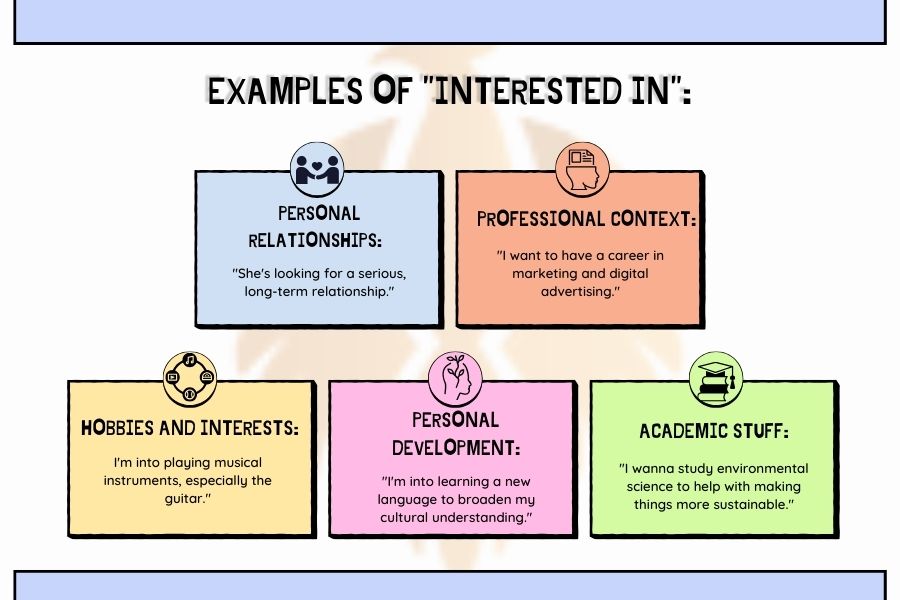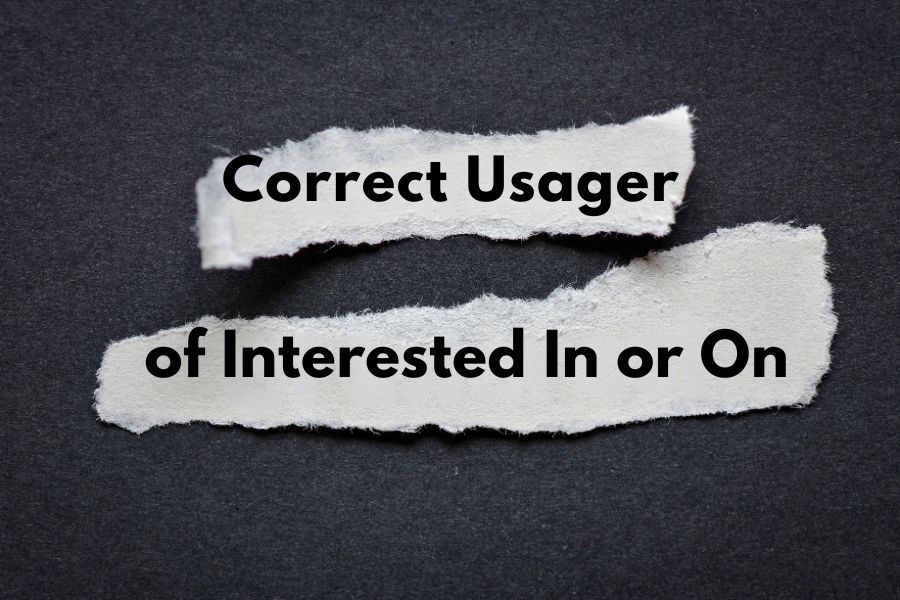In this article, we’re gonna check out the differences between the prepositions “interested in” and “interested on.”
They may seem kinda similar, but it’s super important to understand their distinctions for accurate communication. We’ll give examples to show how to use each phrase correctly.
which one is right – Interested In or On? What’s the main answer?

Whether “Interested In” or “Interested On” is correct depends on the specific context. Both phrases can be right, but how they’re used may vary.
Generally, “Interested In” is more commonly used when someone has a personal interest or curiosity about something or someone.
For example, you might say, “I’m interested in learning about different cultures” or “She’s interested in playing the piano.”
On the other hand, “Interested On” is less common and might not be considered standard. It’s usually used when talking about being into a certain aspect or detail of something.
Like, you could say, “I’m into the impact of technology on society” or “He’s into the effects of climate change.”
Basically, “Interested In” is the more widely used phrase, while “Interested On” is less common and has a more specific use.
But you have to think about the context and how it’s used to decide which phrase is right.
You might also enjoy: In The Office or At The Office: 7 Key Differences [2023]
1. “Interested In”:

“Interested In” is a phrase that people use a lot when they wanna show they’re curious about something or someone.
It means they really like or want that thing or person. You can use it in lots of different situations, like in your personal life or at work.
In personal relationships, “Interested In” usually means you’re attracted to someone romantically or emotionally.
It’s a way to say what you want in a partner or relationship. For example, you might say you’re “Interested In” dating, being friends, or having a serious relationship.
This phrase helps you tell people what you’re looking for and understand each other better.
In a work setting, “Interested In” is often used to say what you’re good at or what you want to do in your career.
It lets you show your passion for certain fields or industries. For example, you might say you’re “Interested In” marketing, technology, or finance.
This info can be super valuable for networking, job hunting, or teaming up with people who are into the same stuff.
The phrase “Interested In” is also used a lot when talking about things you enjoy, hobbies, and personal growth.
It helps you show how pumped you are about certain activities or subjects. Like, someone might say they’re “Interested In” photography, cooking, or picking up a new language.
This info can be really handy for finding people who are into the same things, joining communities, or finding new chances to grow and learn.
How you use “Interested In” can change depending on the situation and where you’re talking about it.
On online places like social media or dating sites, you often get to pick from a list of categories or write a description of what you’re into.
That way, other people can see what you like and have real conversations about shared interests.
It’s important to note that being interested in something doesn’t mean you’re an expert or know a lot about it.
It just means you’re curious and want to learn more. But being “Interested In” can be a starting point for exploring, learning, and developing skills.
Basically, “Interested In” is a phrase to show curiosity, attraction, or desire for a specific subject, activity, or person.
People use it when talking about relationships, work stuff, hobbies, or personal growth.
By sharing your interests, you can connect with others, find opportunities, and have meaningful conversations with people who like the same things.
You might also enjoy: “Humans” or “Humen”? Which One Is Correct?
2. “Interested On”:

the phrase “Interested On” is not really used in English and doesn’t have a widely known definition or usage.
It might be a mistake or a less common phrase. But if we think of it as “Interested In” or “Interested About,” we can give a definition and usage for those phrases.
“Interested In” is a phrase that people often use to show they’re curious, attracted, or want something specific.
It shows a real interest or liking for something and can be used in different situations, both personal and professional.
It lets people talk about their preferences, goals, or areas of expertise. In personal relationships, “Interested In” usually means romantic or emotional attraction.
It’s a way to say what you want or like when it comes to potential partners or relationships.
For example, someone might be like, “I’m into” dating, friendship, or a long-term commitment.
This phrase helps people talk about what they want and understand each other. In a professional way, “I’m into” is often used to show what someone is good at or what they want to do for work.
It lets people show their passion for certain areas or industries. For example, someone might say they’re “into” marketing, technology, or finance.
This info can be helpful for making connections, finding a job, or working with people who have similar interests.
The phrase “I’m into” is also used a lot when talking about hobbies, things you like, and personal growth.
It helps people talk about what they’re excited about. For example, someone might say they’re “into” photography, cooking, or learning a new language.
This info can be good for finding people who like the same things, joining groups, or trying new things.
It’s important to note that being interested in something doesn’t necessarily mean you’re an expert or know a lot about it.
It just means you’re curious and want to learn more about a specific topic. However, being “Interested In” can be a starting point for exploring, learning, and developing skills.
In short, while “Interested On” doesn’t have a widely recognized definition or use, “Interested In” is commonly used to show curiosity, attraction, or desire for a particular subject, activity, or person.
It applies to personal relationships, work situations, and when talking about hobbies or personal growth.
By sharing your interests, you can connect with others, find opportunities, and have meaningful conversations with like-minded people.
You might also enjoy: Trainer or Trainor: 10 Main Differences + Examples [2023]
3. Examples of “Interested In”:

Examples of “Interested In” can vary a lot depending on the situation and what people like.
Here are a few examples to show how this phrase is used:
1. Personal Relationships: – “I want to date someone who also loves outdoor activities.”
– “She’s looking for a serious, long-term relationship.” – “He wants to meet new people and make real connections.”
2. Professional Context: – “I want to have a career in marketing and digital advertising.”
– “She’s interested in finding opportunities in artificial intelligence.” – “He wants to learn more about project management and leadership.”
3. Hobbies and Interests: – “I’m into playing musical instruments, especially the guitar.”
– “She’s really into photography and loves capturing beautiful moments.” – “He’s really into gardening and spends his free time taking care of his plants.”
4. Personal Development: – “I’m into learning a new language to broaden my cultural understanding.”
– “She’s into improving her public speaking skills for professional growth.” – “He’s into reading books on personal finance to get better at managing his money.”
5. Academic Stuff: – “I wanna study environmental science to help with making things more sustainable.”
– “She wants to get a degree in psychology to figure out why people do what they do.” – “He’s into doing research on artificial intelligence and machine learning.”
These examples show how people can talk about what they’re into in different parts of life, like relationships, jobs, hobbies, personal growth, and school stuff.
When they say what they’re into, they can find others who like the same things, find new opportunities, and have cool conversations.
You might also enjoy: Boys’ or Boy’s– Which One is Correct? + Example
4. Common Mistakes of Interested In or On:

When you use the phrases “Interested In” or “Interested On,” a lot of people make mistakes. These mistakes can cause confusion or misunderstandings.
It’s important to know how to use these phrases correctly for clear communication.
1. Mixing up “Interested In” with “Interested On”: One mistake people often make is using “Interested On” instead of “Interested In.”
The right way to show curiosity or attraction towards a subject is by saying “Interested In.”
For example, saying “I am interested on photography” is wrong. The correct way to say it is “I am interested in photography.”
2. Messing up the preposition: Another mistake is using the wrong preposition after “Interested In.”
It’s important to use the right preposition that matches the subject or activity you’re interested in.
For example, saying “I’m interested in on technology” is wrong. The correct way would be “I’m interested in technology.”
3. Not being specific enough: Sometimes, people use “Interested In” without specifying what they’re interested in.
This can cause confusion or unclear communication. It’s crucial to be specific and clear when expressing your interests.
For instance, saying “I’m interested in” without mentioning what you’re interested in can leave the listener or reader unsure about your intentions.
4. Using the phrase “Interested In” too much can make your communication repetitive and less interesting.
Instead, try using different words and expressions to show your curiosity or attraction towards a subject.
5. When talking about your interests, it’s helpful to give some background or explanation.
Just saying “I am interested in” without any further information might not give enough context for others to understand or have a meaningful conversation.
Adding a brief explanation or sharing why you’re interested can make your communication more effective.
6. Not aligning interests with actions: It’s important to make sure your interests match up with what you actually do.
Just saying you’re interested in something without actually going after it or getting involved in related stuff might make you seem like you’re not being genuine.
You gotta show your interest through your actions and by getting involved in relevant things or talking about them.
In the end, when you use phrases like “Interested In” or “Interested On,” you gotta watch out for common mistakes so you can communicate effectively.
Some of these mistakes include getting the preposition wrong, not being specific enough, using the phrase too much, not giving any context, and not matching up your interests with what you do.
If you keep these mistakes in mind, you can clearly express your interests and have meaningful conversations with people.
You might also enjoy: Thanks God or Thank God – Fully Explained + Video
5. Correct Usage of Interested In or On:

The right way to use “Interested In” or “Interested On” depends on the context and how you say it. Let’s see when to use these phrases in different situations.
1. Interested In: When you want to show curiosity, attraction, or desire for something, like a subject, activity, or person, you should say “Interested In.”
For example: – “I’m interested in learning more about artificial intelligence.” – “She’s interested in starting a career in finance.”
– “They’re interested in going to different countries.” In these examples, “Interested In” is used to show a general interest or curiosity for a specific topic or area.
2. Interested On: The phrase “Interested On” is not used very often and might not be correct in most cases.
But there are a few specific situations where “Interested On” can be used correctly: a) When talking about a particular date or time: – “I wanna go to the conference on Friday.”
– “She’s curious about the lecture on climate change next week.” In these examples, “Interested On” is used to specify the date or time when the event or activity of interest will happen.
When discussing the focus or subject of interest: – “He’s into the impact of technology on society.”
The research study is all about how exercise affects mental health. In these examples, “Interested On” is used to show the specific aspect or subject that we are interested in.
It’s important to note that “Interested In” is the more commonly used and widely accepted phrase in most situations.
“Interested On” should only be used in specific situations as mentioned above. When you’re not sure, it’s always better to use “Interested In” because it’s the more standard and widely recognized phrase.
Moreover, you gotta think about how the sentence is put together and make sure the preposition matches what you mean and the situation.
In conclusion, whether you say “Interested In” or “Interested On” depends on what you’re talking about and how you’re saying it.
“Interested In” is the one people use more often and agree on, when they’re generally interested or curious about something or someone.
You can use “Interested On” in certain cases, like when you’re talking about a specific date or time or when you’re focusing on a particular area of interest. But you should use it carefully and not too much.
Which preposition is used with interested?
The preposition “in” is typically used with the adjective “interested.” For example, you can say “I am interested in learning more about this topic.”
What is an example of interested in?
Here is an example sentence using “interested in”:
“I am interested in learning new languages and experiencing different cultures.”
What specific context are you looking for in order to better understand the difference between “interested in” and “interested on”?
The difference between “interested in” and “interested on” is primarily a matter of correct usage in English.
The phrase “interested in” is the more commonly used and correct form when expressing interest in a particular subject, activity, or topic. For example, “I am interested in learning more about history.”
On the other hand, “interested on” is not typically used in standard English. It is possible that it may be used in some dialects or non-standard forms of English, but in general, “interested in” is the correct and widely accepted phrase to express interest in something.
Can you provide an example of a situation where someone might mistakenly use “interested on” instead of “interested in”?
One example of a situation where someone might mistakenly use “interested on” instead of “interested in” could be when discussing an upcoming event or activity.
For instance, someone might say, “I’m interested on attending the concert next week,” instead of the correct form, “I’m interested in attending the concert next week.” This could be a common mistake made by non-native English speakers or individuals who are not fully fluent in the language.
Why do non-native English speakers or individuals who are not fully fluent in the language often make the mistake of using “interested on” instead of “interested in”?
Non-native English speakers or those who are not fully fluent in the language may make the mistake of using “interested on” instead of “interested in” due to the influence of their native language’s grammar rules.
In some languages, the equivalent of “on” might be used to express interest in something. Therefore, when speaking or writing in English, they may inadvertently apply the grammar rules of their native language, leading to errors like using “interested on” instead of “interested in.”
Additionally, language acquisition and usage are complex processes, and mistakes are a natural part of learning.
Non-native speakers may simply be unfamiliar with the correct preposition to use in this context and may need more exposure to the language to internalize the correct usage.
How important is it for language learners to practice using the correct prepositions in context to avoid common mistakes like using “interested on” instead of “interested in”?

Practicing the correct use of prepositions in context is highly important for language learners to avoid common mistakes. Prepositions play a crucial role in conveying the intended meaning and are often specific to each language. Using the correct preposition can significantly impact the clarity and accuracy of the message being communicated.
In the case of “interested in” versus “interested on,” understanding and practicing the correct preposition in context will help language learners convey their thoughts accurately and fluently.
Through practice and exposure to the language, learners can become more familiar with the appropriate use of prepositions, reducing the likelihood of making common mistakes like using “interested on” instead of “interested in.” Regular practice and immersion in the language are key for language learners to develop a more intuitive grasp of prepositions and other grammatical nuances.
What is a synonym for I became interested in?
A synonym for “I became interested in” could be “I developed an interest in.”
What is a synonym for show an interest in?
A synonym for “show an interest in” could be “demonstrate interest in.”
How do you say you are interested in something?
You can say, “I am interested in [the specific thing or topic].”
How do you answer what interested you in this position?
You can respond by highlighting aspects of the position that align with your skills, interests, and career goals. For example: “I am interested in this position because it provides an opportunity to utilize my skills in [mention specific skills] and aligns with my passion for [mention relevant aspect of the job or industry]. I am excited about the prospect of [mention specific responsibilities or projects] and believe it’s a great fit for my professional growth.”
How do you explain why I am interested in a position?
To explain why you are interested in a position, focus on the alignment between your skills, experiences, and the company’s needs or values. You could say something like, “I am interested in this position because it offers a chance to apply my skills in [mention specific skills] while contributing to [highlight a specific aspect or goal of the company]. I am drawn to the company’s [mention a notable feature, such as culture or mission], and I believe my background makes me well-suited to contribute effectively in this role.”
Conclusion:
Understanding the differences between “interested in” and “interested on” is super important for good communication.
“Interested in” is the right and widely accepted phrase, but “interested on” is considered wrong.
By using “interested in” correctly, you can show your curiosity and attraction towards different things, stuff, or people accurately.

Hi, welcome to my blog! My name is Omid and I am thrilled to have you here! I am an English language teacher with 12 years of experience and hold multiple international certifications (TESOL, IELTS, TOEFL, PTE, CELTA). Additionally, I hold a PhD in Applied Linguistics with a specialization in Teaching English as a Second Language (TESL), which fuels my passion for teaching English and assisting others in mastering the language. To me, nothing is more rewarding than helping individuals enhance their English language abilities through various methods. So, let’s embark on this journey of learning English together.





